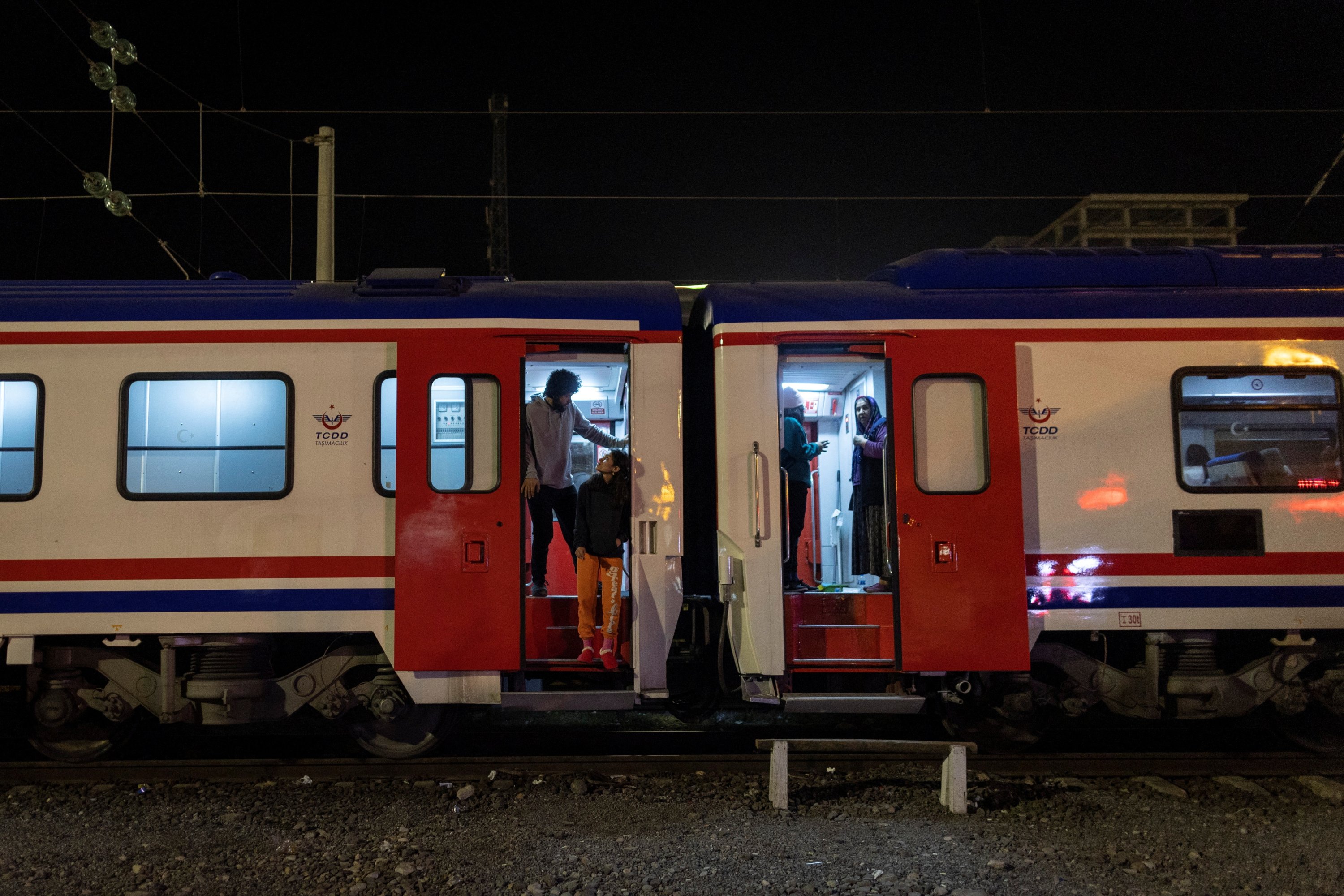© Turkuvaz Haberleşme ve Yayıncılık 2024
No new rescues save for some animals are being reported from Türkiye’s earthquake-hit provinces as Türkiye marks 25 days since the Feb. 6 catastrophe that claimed thousands of lives. In the aftermath, people strive for a sense of normalcy, resuming their lives wherever they can find shelter, be it a tent, a “container home” or trains.
In the meantime, relief work continues in provinces shaken by tremors with some good news, such as a dog rescued from the rubble after weeks and reunions between family members who lost each other in the tragedy renew hopes for the future.
Sabriye Karan's late husband worked for the Turkish national rail company for 32 years and her daughter Nehir grew up riding trains. After powerful earthquakes struck Türkiye and damaged her home, she and Nehir moved into one.
"We never imagined we would live here," said Sabriye, who has been sharing a two-bed sleeper cabin with 13-year-old Nehir for the past 18 days."
Although Sabriye and Nehir's third-floor flat was only lightly hit, with some cracks appearing on the walls, they fear moving back. Subsequent earthquakes and aftershocks have caused further damage to weakened buildings and authorities have warned people that many are unsafe to enter.

For now, the transience usually associated with train stations has evolved into an ambivalent permanence for the two. But even in the relative safety of the train carriage, anxiety lingers. While a train worker was fixing the tracks one night, the train jolted, causing Nehir to gasp and cling to her mother.
Mithat Kilisli and his 5-month-old granddaughter Zehra spent two and a half days trapped in the rubble together after Türkiye's earthquake before rescuers heard their cries.
Pulled from the wreckage separately, Kilisli faced an agonizing three-week wait before being reunited with Zehra, the only other surviving member of his family, who had been taken to a distant hospital. Kilisli, 69, traveled hundreds of kilometers from their former home in Hatay province to meet her in Ankara. After taking a DNA test to prove their relationship, he took her away with him.
Seeing her again at a children's home run by Türkiye's Family Ministry, he burst into tears. "You are my life," he said, kissing her hands. "Thank God I've found you."
"This poor child constantly cried but also slept for some time under the rubble," said Kilisli, cradling her in his lap. Finally, rescuers heard him, he saw their searchlight and explained where he was. "My wound is very deep, but right now I feel as if I have forgotten my pain. God bless everyone.
The teams from a local municipality in central Türkiye saved Aleks the dog on Wednesday and delivered him to Haytap, a Turkish animal protection association in the city of Antakya three weeks after last month's 7.8-magnitude deadly earthquake, local media reported on Thursday.
A video from Demirören News Agency (DHA) shows rescuers reaching between two large concrete slabs and calling to the trapped canine.
"Aleks, come, my dear," one rescuer calls to the dog. Images then showed the rescuers embracing the dog, who appears to be alert and in good health, and offering him water.
"Every living thing matters to us, human beings or animals," one local was quoted as saying by the privately-owned DHA agency after the miracle rescue.
Rescue workers have saved hundreds of trapped cats, dogs, rabbits and birds cherished by the locals in Antakya, one of the cities flattened by the disaster.
Animal rescue stories are a balm for the country, which has been left in shock by the worst natural disaster in Türkiye's post-Ottoman history.
Volunteers are brimming with motivation to help earthquake victims at the tent city in a district of Türkiye's Gaziantep province, says an official from the Ministry of Youth and Sports.
"From the first day of the earthquakes, we sent nearly 2,500 volunteer staff and volunteer friends to the region, that is to 11 provinces. Our relevant unit chiefs supervise the coordination of each of these. Some travel to Malatya, others to Hatay, and some to İslahiye. They don't need much encouragement. They're already brimming with motivation," told Tufan Turhan, a youth coordinator at the tent city in Islahiye.
The tent city is home to more than 350 tents hosting both Turks and Syrians. "Our staff and colleagues are also voluntarily working in this building. They, too, are earthquake victims, yet many of our friends who have been working here since the first day of the earthquake continue to do so on a volunteer basis. They have never left from the beginning. Our friends pack incoming humanitarian goods and distribute them to our tents in need," Turhan said.
The location is entirely fenced-in and protected. Anti-terrorism unit police and military personnel provide security by controlling the entry and exit of the regular residents.
Turkish authorities have been racing to find accommodation for the more than 1.5 million people left homeless after February's huge earthquakes, which killed some 50,000 people in Türkiye and Syria. Survivors have been sheltering in tents, container homes, hotel resorts and even train carriages in Iskenderun, a port city in the province of Hatay, badly hit by the earthquakes.
The 7.7 and 7.6- magnitude quakes struck 11 provinces – Adana, Adıyaman, Diyarbakır, Elazığ, Hatay, Gaziantep, Kahramanmaraş, Kilis, Malatya, Osmaniye and Şanlıurfa, and affected more than 13 million people in Türkiye.
